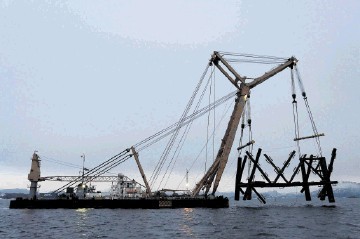
I have read many reports on the UKCS decommissioning market over the last decade, as many other people in the industry must also have done. All have proved to be wildly inaccurate in relation to both the size and timing of the market, which has been very much smaller than predicted.
There are two main reasons for that. Firstly, high oil and gas prices have extended the lives of many of the fields, both in the North Sea and elsewhere, by improving project economics. Secondly, technological developments, particularly subsea, have had similar impacts. The net effect has been to push back the UKCS decommissioning market by about a decade.
Over the last five years, the annual expenditure has averaged only about £200million per year, which is a fraction of what most reports predicted. Total UKCS expenditure is currently about £15billion per year, with capex about £6.5billion (40% of the total) and opex £8billion (55%). Spending on exploration has fallen substantially lately.
Nevertheless, it now seems certain that there will be a massive increase in the decom market over the next decade, despite oil prices remaining very high. Some major projects, notably Shell’s Brent field, are very close to being confirmed.
Basically, a number of fields have just about been pushed as far as is physically possible with regard to recovery rate and a number of installations are evidently too long in the tooth to consider economic repair/life extension engineering.
There have been major uncertainties about the tax regime but the latest UK budget appears to have removed most of those. Chancellor George Osborne stated in his budget speech that “we will end the uncertainty over decommissioning tax relief that has hung over the industry for years by entering into a contractual approach.”
To be honest I do not know what a contractual approach means but the chancellor’s statement has been strongly welcomed by the industry. The Treasury estimates that the value of the change will be £115million in the next financial year.
Oil & Gas UK recently published a very useful report entitled 2011 Decommissioning Insight, based on a recent survey of operators. It forecasts that over the five years 2012-16 there will be 51 projects, of which 32 will involve platforms and 23 subsea structures, plus 202 pipelines.
Decom expenditure is estimated to total £3.3billion over the period. The annual average of £660million would be more than three times the recent average. I believe that spending in the 2016-20 period will probably be more than twice these estimates.
The Brent decommissioning programme alone will account for more than £4.5billion and provide work for about ten years, such are the complexities involved with this four-platform field complex.
The industry needs continuity of work which will be difficult to provide given the relatively large number of operators involved. The market in the past has fluctuated massively from year to year, which has made it difficult for the supply chain involved.
The industry now has a good representative body in Decom North Sea, run by Brian Nixon and Sarah Hillyear, both ex-Scottish Enterprise. I hope that they, Oil & Gas UK and DECC will work together to try to avoid the fluctuations in activity experienced to date.
There is only one full equipped onshore decom facility in Scotland at the present time – in Lerwick – and three in England, although others can be used. There are also well established yards in Norway which I expect will compete strongly for UKCS projects.
I was in Shetland last week and surprised to find that a Norwegian company AF Decom have plans for a deepwater facility at Dales Voe, just outside Lerwick, which would obviously compete with the existing base.
There are also plans for a facility at Peterhead and it is possible that Global Energy, the new owners of the Nigg yard, could diversify into decom work there.
It is important to bear in mind, however, that most of the work will be done offshore rather than onshore. The former includes well plugging and abandonment, topsides and jacket removal, and pipeline decommissioning. Onshore disposal will be a much smaller market.
Tony Mackay is the MD of energy economists Mackay Consultants
Recommended for you
